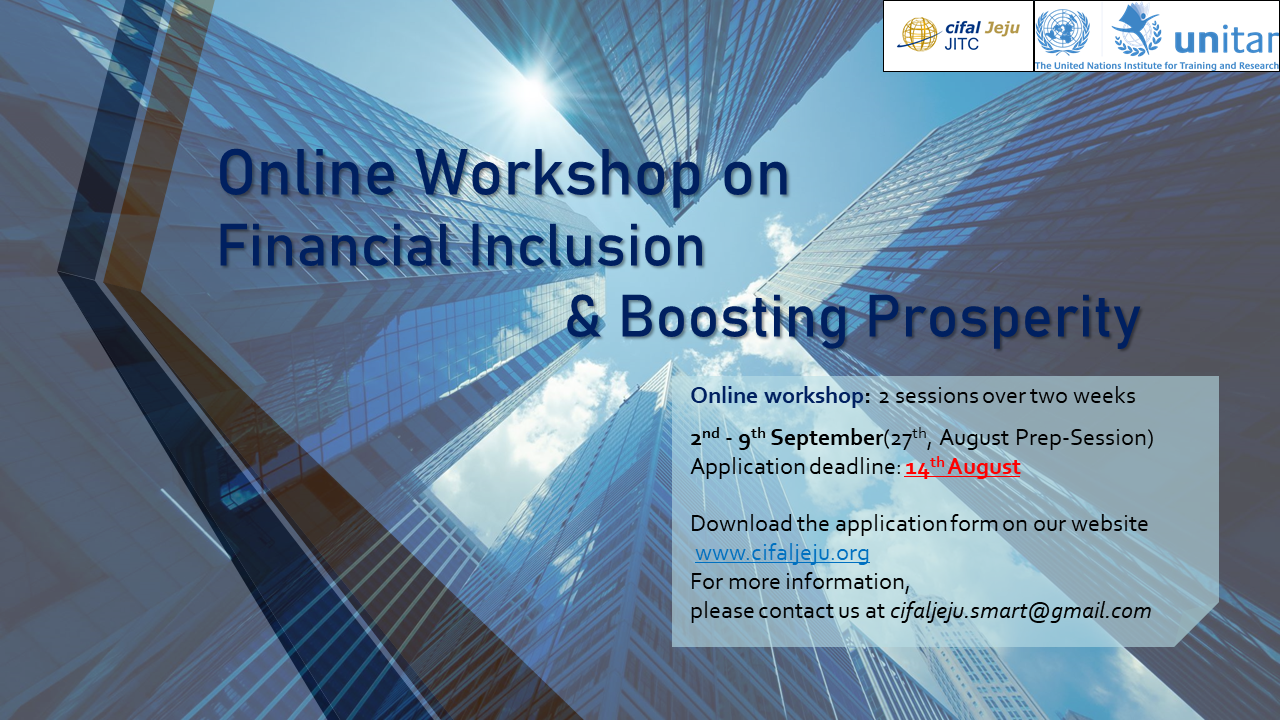|
Financial Inclusion and Boosting Prosperity27 August - 9 September 2020Jeju-do, Republic of KoreaBackground
Inclusive and sustainable economic growth is what the Sustainable
Development Goal 8 ultimately calls for. As a response, policy makers and
researchers around the world have paid increasing attention to the linkage between
poverty alleviation and the recent developments of inclusive finance. In the context of sustainable development, financial inclusion and green
investment have served as a driver for sustained economic growth[1].
Inclusive finance
means “individuals and businesses have access to useful and affordable
financial products and services that meet their needs delivered in a
responsible and sustainable way[2].”
As opposed to the traditional finance where people living in rural areas have
largely been overlooked because of their low income level, inclusive finance provides
equal opportunities for the low-income people to enjoy quality financial
services. In addition, inclusive
finance can be directly related to the accessibility of digital financial
services. Supported by ever-developing financial service and technologies,
digital finance has the potential as “greases the wheels[3]”
of the economic activity. If made equally available for everyone, it would
benefit a wider range of people, with positive impacts on the economic
development. At the same time,
the challenge of financing sustainable development has made green finance a
more prominent solution. Defined as the increasing financial flows to the
priorities of sustainable development[4],
it serves as a catalyst for increasing the volume of investment in sustainable
growth and achieving financial stability through consolidating environmental,
social and governance factors into investment decision-making[5].
Based on this
understanding, CIFAL Jeju organizes on Online Workshop on Financial Inclusion
and Boosting Prosperity that aims to support the Asian Pacific government
officials and leaders of society in making and implementing policies for
inclusive and sustainable economic development. Event objectives
The
workshop is expected to help the rural communities in Asia and Pacific to seize
the opportunities generated by the recent developments in inclusive finance,
and to give guidance to policy makers in the region on their policy attempts
towards inclusive and sustainable future. For the capacity building,
this event will; ·
Provide an opportunity for the local governments in the Asia-Pacific region
to virtually exchange policies and best practices on financial inclusion and
green investment; ·
Establish a strong network which can be utilized after the workshop; ·
Offer a virtual venue to motivate each other to implement well-designed
policies, with a particular focus on UN SDGs. Learning objectives
At the end of the
workshop, the participants will be able to: ·
Understand the recent developments of financial inclusion in the
sustainable development context; ·
Identify risk factors in green financing to propose policy solutions ·
Present the action plan proposals; ·
Effectively promote the benefits of inclusive digital service and green
financing for inclusive and sustainable
transformation. Target audiences
Central/local
authorities, representatives from NGOs, leaders of regional and community-based
organizations, academic and training institutions and other local actors, who
are working in the field of sustainable finance and striving to achieve
financial inclusion within the Asia-Pacific region. Event details
·
Event type Online workshop ·
Date 27 August -
9 September, 2020 ·
Organizer UNITAR CIFAL Jeju/Jeju
International Training Center ·
Certificate UNITAR and UNITAR CIFAL Jeju/JITC will
jointly issue a certificate upon the
completion of the training. *Along with the certificate, CIFAL Jeju is going to select one best
participant during the workshop, who will be given a priority in selection of
beneficiaries when applying for an offline capacity building program organized
by CIFAL Jeju in the future. Programme Detail
Application and
deadline
Send the following
documents to cifaljeju.smart@gmail.com, email titled: UNITAR CIFAL Jeju Financial WS Application by
14th August, 2020 (Friday):
** Late application will NOT be accepted. Requirements
Applicants are
required to: ·
Be fluent in written and spoken English ·
Complete and submit assignments on
time ·
Actively participate in the 2-week training
program Note
·
Application without the required documents will
NOT be considered. ·
Participation is subject to the approval of the
application by UNITAR CIFAL Jeju/JITC. [1] Ramakrishnan, D. (2010). BFSI: Best Practices
in Financial Inclusion. 22nd SKOCH Summit. [2] https://www.worldbank.org/en/topic/financialinclusion/overview [3] Hasan, M. M., Yajuan, L., & Khan, S.
(2020). Promoting China’s inclusive finance through digital financial
services. Global Business Review, 0972150919895348 [4] https://www.unenvironment.org/regions/asia-and-pacific/regional-initiatives/supporting-resource-efficiency/green-financing [5] Ibragimov, Z., Lyeonov, S., & Pimonenko, T.
(2019). Green investing for SDGS: EU experience for developing countries. Economic
and Social Development: Book of Proceedings, 867-876 |









